WAR! 1914
Lancaster and The King's Own go to War.
Generously supported by the Sir John Fisher Foundation.
The First Days of the War
The First World War was a result of growing tensions and mistrust
between European nations, not least because of the emerging strength of
Germany. The spark that ignited the war was the assassination, by a
Bosnian-Serb Nationalist, of the Austrian Archduke Franz Ferdinand and
his wife whilst visiting Sarajevo in Serbia on 28th June 1914.
On Tuesday 4th August 1914, Britain declared war on Germany when the
neutrality of Belgium, guaranteed by the 1839 Treaty of London was
violated. Britain probably acted to prevent the port of Antwerp falling
under German control rather than the treaty breach.
With no radio or television, it was the newspapers of 5th August that
broke the news of the war. In rural areas, notices appeared on public
buildings and at railway stations. Rather than welcome the outbreak of
war with great flag-waving enthusiasm, people simply gathered together
in order to learn the news.
In Lancaster….
The Lancaster Guardian of 8th August 1914 reported on the start of the
war:
Lancaster, as a military centre, has naturally shared to the fullest
extent in the gravity of the situation caused by the great European War.
Throughout the week-end the feeling of suspense was almost painful in
its intensity. The hope was freely expressed that England would be able
to maintain strict neutrality, but fears were then entertained that acts
of aggression on the part of Germany would render interference
imperatively necessary, and it was felt we were under the shadow of a
great calamity the ultimate outcome of which it was impossible to
foretell. At most of the places of worship on Sunday special prayers of
intercession for Peace were offered; and on Monday, though holiday
jaunts already arranged were not abandoned, there was little of the real
holiday spirit abroad. Everywhere the dismal prospect of a sanguinary
and probably prolonged struggle were eagerly discussed, and most people
were going about with face which if not exactly lugubrious and mournful,
were rendered more grave than usual by a sense of impending tragedy.
The period of suspense practically came to an end on Tuesday when the
preliminaries to actual mobilisation convinced everyone that England
would inevitably be drawn into the fray, though the tidings of the
declaration of war did not become generally known until the following
morning. Naturally there was a good deal of excitement, but there was no
“mafficking” and few outward demonstrations of enthusiasm. There was no
lack of patriotism, but the whole business had been brought about too
suddenly and developed such huge proportions in a very brief space of
time as to almost stagger people who under other circumstances would
probably be most demonstrative. The chief feeling was one of amazement
at the aggressions of Germany, and although groups of people were to be
found in every part of the town discussing the situation, there were no
shouting and cheering crowds thronging the streets, which in this
respect bore a marked contrast to the scenes they presented during the
period of mobilisation for the Boer war.
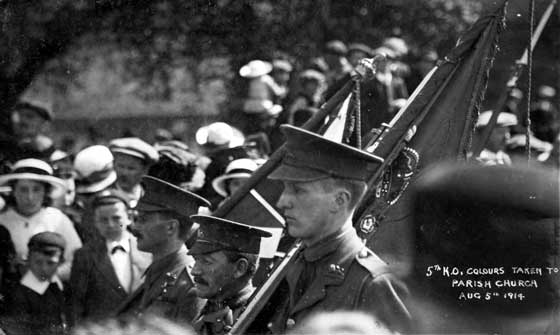
The Colours of the 5th Battalion, King's Own Royal Lancaster Regiment
being deposited at Lancaster Parish Church, 5th August 1914, laid up for
the duration of the war. Colours had not been taken on active service
since 1881.
Accession Number: KO1812/01
1st Battalion in Dover
In Dover the 1st Battalion of the King’s Own was mobilised, the
Commanding Officer, Lieutenant Colonel Dykes, gave the order a full day
before the official order was received.
Lieutenant Colonel Dykes, commanding officer of the 1st Battalion wrote
to his mother on 5th August whilst his battalion got ready for war.
“I was fully convinced that unless we, as a nation, were to sacrifice
our honour, we were bound to go to war. First, in accordance with our
most solemn obligations to France and Belgium. Secondly, to preserve our
existence as a Nation and an Empire. Consequently without waiting for
orders, I got to work at once on the great work of mobilisation, last
Monday morning. I am now thankful; for though we are terribly busy, a
great deal was done before the order arrived yesterday at 5 o’clock. We
are now more than a day ahead of our programme and have saved a great
deal of rush. ….we are awaiting the arrival of reservists, who will be
pouring in tomorrow and subsequent days. My battalion will then be 31
officers and 1037 other ranks.
One thing only I do ask you and that is to accept the news and whatever
comes of it, with the calm strength and bravery which you have always
shown in times of stress. We are all happy and full of confidence and I
think that rarely never did war begin in a more thoroughly just cause.
You used to think me cynical, I think, in our Billiard Room War Councils
when I used to air my views on the value of German Treaties, Vows and
Protestations. There is no need to ‘crow’! The truth of all I said
stands self evident today. On the heads of the German and Austrian
Emperors, who have plotted and planned all this, for years, while
professing peace…..”
Accession Number: KO2654/036
Opposition to the war was very limited, three members of the government
resigned and there were some small anti-war protests. The general public
supported the war and any anti war opinions were unpopular.
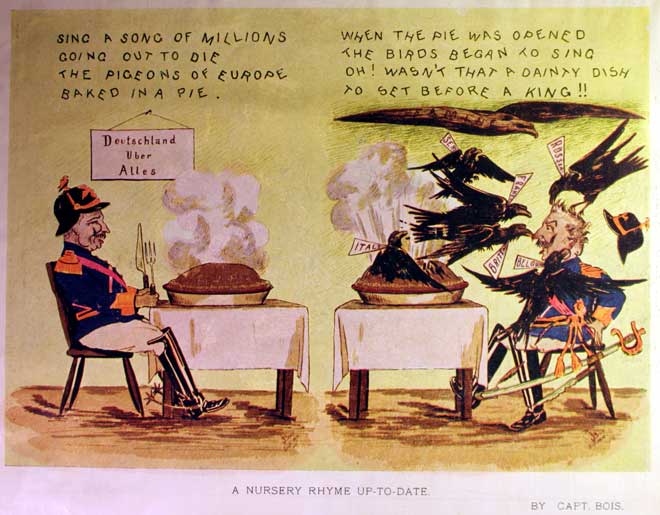
‘A Nursery Rhyme Up To Date’ by Captain John Bois of the 2nd Battalion,
serving in India, published in “Indian Ink”, September 1914
Accession Number: KOLIB0199/01-001
‘A Nursery Rhyme Up To Date’ by Captain Bois. Sep 1914
“Sing a song of millions
Going out to die
The pigeons of Europe
Baked in pie
When the pie was opened
The birds began to sing
Oh! Wasn’t that a dainty dish
to set before a King!!”
The very first shots of the war
With the order to mobilise, soldiers of the 1st King’s Own in Dover were
detailed to guard locations such as the breakwater forts The Royal Navy
was soon sweeping German shipping from the seas, and among the vessels
brought into the harbour was the 'Perkoe', a four-masted barque of 3,700
tons, shipping oil from New York to Hamburg. Every man of the garrison
was already committed, so the band boys of the King’s Own were detailed
to guard the Perkoe. The German crew kept down below, but in the middle
of the night the ship’s cook thought it safe to put out a cautious head
in search of air. He was greeted by a volley of fire which demonstrated
the alertness of the band boys.. It also gave them the distinction of
firing the first shots of the war.
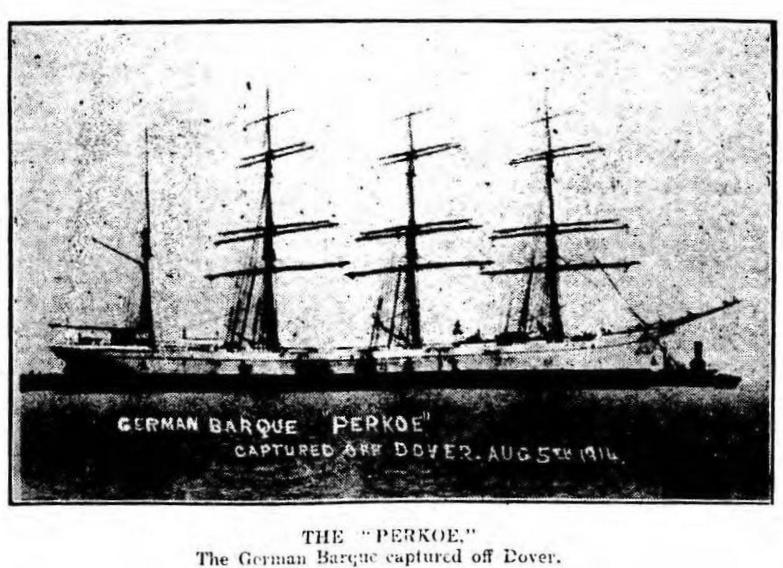
German Barque “Perkoe” captured at Dover, 5th August 1914 and guarded by
the band boys of the 1st Battalion, King’s Own.
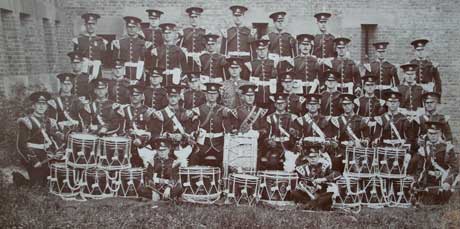
Drum Major Wilfred Thompson and the boys while they were at Grand Shaft
Barracks, Dover. These were the boys who were reported to have fired the
first British shots of the war in Dover Harbour.
KO1121/119
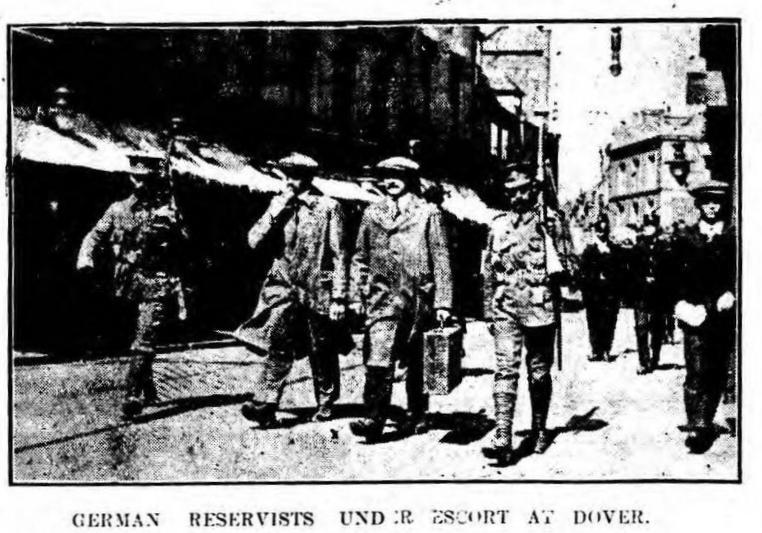
Photograph from the Dover Express of 14th August 1914 showing Germans
under escort at Dover by soldiers of the 1st King’s Own.
© Images are copyright, Trustees of the King's Own Royal Regiment Museum.
You must seek permission prior to
publication of any of our images.
Only a proportion of our collections
are on display at anyone time. Certain items are on loan for display
in other institutions. An appointment is required to consult any of
our collections which are held in store.






